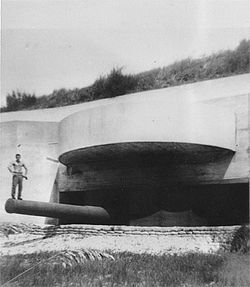Fort Levett
| Fort Levett | |
|---|---|
| Part of Harbor Defenses of Portland | |
| Cushing Island, Maine | |

12-inch casemated gun, similar to those at Battery Foote, Fort Levett.
|
|
|
Location in Maine
|
|
| Coordinates | 43°38′35″N 70°11′43″W / 43.64306°N 70.19528°WCoordinates: 43°38′35″N 70°11′43″W / 43.64306°N 70.19528°W |
| Type | Coastal Defense |
| Site information | |
| Owner | private |
| Controlled by | private |
| Open to the public |
no |
| Site history | |
| Built | 1898 |
| Built by | United States Army |
| In use | 1898-1948 |
| Battles/wars |
World War I World War II |
Fort Levett was a former U.S. Army fort built on Cushing Island, Maine beginning in 1898. Located in Cumberland County, Maine, in Casco Bay near Portland, Maine, the fort was heavily fortified with guns for coastal defense. Conceived under the Endicott Program in 1885 and begun in the wake of the Spanish–American War, Fort Levett was manned during both World Wars. The fort's name is sometimes mis-spelled as "Fort Leavitt".
Fort Levett was built on 140 acres (0.57 km2) of Cushing Island, and the coast artillery fortification was visited by several Secretaries of War, including Jacob M. Dickinson in 1909. The fort, whose call letters were FV, was part of a network of forts guarding Portland Harbor and Casco Bay under the Coast Defenses of Portland (Harbor Defenses after 1925), which included Levett, Fort Williams on Portland Head, and Fort McKinley on Great Diamond Island as well as Fort Preble. Fort Scammel and Fort Gorges, once strongly fortified and guarding the harbor entrance, were decommissioned earlier than the previous three forts, and were not modernized after the 1870s. The forts were built by the United States Army Corps of Engineers, maintained by the Army's Ordnance Department, and after 1907 were manned by the United States Army Coast Artillery Corps.
...
Wikipedia

